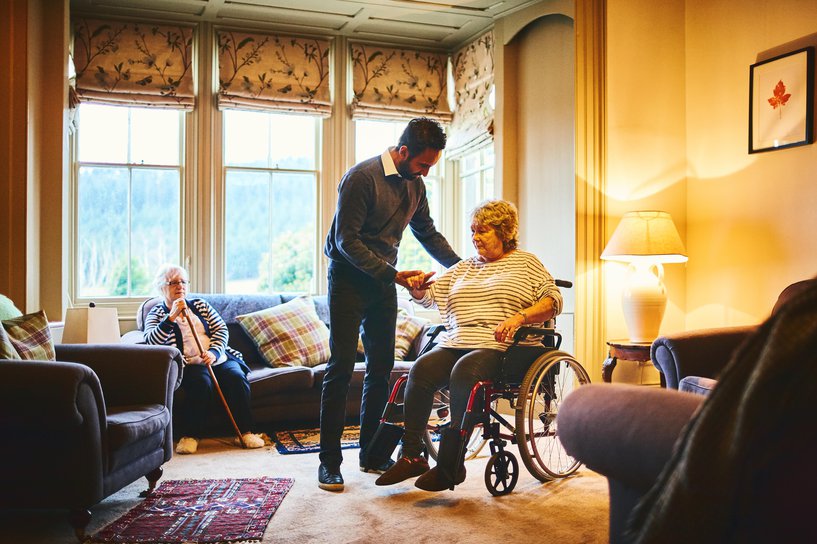It can be nothing more than a tragic day when an elderly relative resides in a nursing care home, whether it is a ‘residential’ or a ‘nursing’ category. It is hoped that something will happen that you have talked deeply with your relative and you will be very lucky if he has come up with an option without compromising on the situation. I hope that my personal story can tell others what the experience has been like for me and the insights I have discovered about nursing home care to consider others as an option for their elderly parents. Will be helpful in doing.
I was very lucky as my elderly, the blind mother always told me that this is how it should be (i.e. to take care of herself when the time is right) and she was very good just came along with this process. The moment of leaving the flat. I will always remember that he takes her to the last step on the doorstep of his house and I often think, in a sense, it helps that he was blind because he had to 'look around for the last time' inside his house. Was not needed. Or environs and it was a tremendous relief.
I didn't know before that there were two categories of elderly care homes - residential or nursing - although I think it's self-explanatory that, if you need to be a nurse or need 24-hour care, your relative's doctor Must be approved to take care. As my mother was blind, she came into the nursing care category. Financial statements about living in care homes are worked out before entry by appropriate professionals, family and care home management and any further personal contributions depend on whether one's income exceeds a certain limit for years. - Will be different every year.
I have older brothers and I have suggested one by one that since there was a visually impaired nursing home in the city ‘for the visually impaired’, where they lived an hour’s drive, it might be an idea for them to go there. They had a place ready. I thought it would be a selfless thing to do to provide the best possible ‘blind’ care. I thought it would give my mom a chance to enjoy life in one place, which is really for the visually impaired. I was willing to sacrifice proximity more distance so that he could live life to the fullest in a blind-specific environment, even if it meant coming to his house every weekend as every day.
I visited the house before her entry (in fact, more than one trip is best recommended) and it was a lovely place with lots of light, airy rooms, but what I didn't do - and be careful - What it really is is that they did it for the visually impaired who insisted on being 'blind' in the title of care home. I just guessed that it would be clearly better for him on the grounds, that for a blind person life was bound to be a lot.
Sadly, this did not prove to be true as I realized that, as much as the place was lovely and at the same time very pleasant staff, she was no better than me as I kept her close to me in my hometown. They had nothing to be able to grab the attention of the staff i.e. nothing to press or ring which meant they had to resort to shouting, which made them feel louder and harder and I didn’t Wanted my mom to turn into one. ‘Shutters’ when facilities were supposed to be there to be able to focus on the sight-focused space in the first place. There were no emergency buttons or any other alerts - just the bedroom doors were left permanently open so residents could be monitored or heard passing and the lack of privacy in them did not appeal to me. I couldn’t believe that the issue was not considered a priority in a blind-oriented place and then began to realize that, in fact, there were quite a few people here who could see really well. So, maybe this ‘blind’ institution wasn’t completely hardened? Therefore, full consideration should be given to what the nursing care home claims in terms of offering care services
In short, after my mother's three months of trial (which is entitled to one before the last residency), there was a meeting between the social worker, the care worker, my mother and me in which my mother said that although she was not sad here Was. Still prefer to go back home near a care home. Suffice it to say that a place became available in a nursing care home in her home town (which I was not previously allowed to apply because she was not marked as a 'nursing' category by the doctor at the time of application), We happily settled him there. I realized that I had made a big mistake by not fully examining the facilities of the previous nursing home and it was really emotionally foolish to send my mother so far when we were really close to each other in the family and this I was really walking him day by day. I can only say that, although I made this mistake, I did it with the best intentions but, most importantly, I fixed the situation as soon as possible.
It is worth noting that, in general, it is not always made clear to home care families that it will be up to them to keep their elderly relatives physically mobile i.e. walk them up and down. Move to Corridors, outdoors in gardens etc. This is something that finally became clear to me.
I was shocked to learn that it was not necessary to keep one's relative's organ in the care agenda and to keep it active was the priority. Please keep this in mind as it is important that your relative does not become less active (if, of course, they had a certain level of activity and strength before admission) on admission to nursing or residential care because mobility is a priority. Is not seen as, nor is it the employee time that you realize it, unless the resident needs physical therapy specifically in their care package. Sadly in the case of a blind elderly person inactivity increases unless you take responsibility for motivating and exercising them but only if he / she is equally prepared, I can add.
Staff members in a care home have many titles. For example, don’t be afraid to ask what a ‘key worker’ is. Who is this What exactly are they responsible for? 'Ask what the residence of all the employees is towards the residents. Do not allow anyone to feed or stay close to their relative with a ‘recovering’ cold or chest infection and think not to say anything about such a report as the elderly are vulnerable to the infection.
Get involved in residential home activities as much as possible and have regular meetings with the manager about your relative's progress, medical and emotional. Help employees figure out what is best for your relatives so they can know all the little likes and dislikes and be able to accommodate them. Make sure they take care of expensive things like false teeth and hearing aids, for example, and even washing clothes, paying special attention to the care of special materials. My mom liked to eat her food in her room because she was fed - it’s permissible and make sure the caring house does that, it’s your relative’s wish. It may be helpful to note that these days all residents have private rooms.
Your relative will also have their own personal file, where the employee records what your relative recorded that day and any useful comments that arise, which you are allowed to read at any time and query if necessary. It is good to note the level of involvement with the activities and let the staff pay attention to it day by day as it shows you how responsible the home is for the quality of life.
One last piece of advice - you will always come across people who say, 'I can never keep my parents at home.' It is very ignorant and painful to say this to the people around them who are thinking of doing so, or have done so, because they have no understanding of the personal circumstances, reasons and background of that person or relative. I will always, always feel guilty until the end of my days about not caring for my mother and always be surprised to step back if I have to and forever. It doesn't matter what anyone tells me.
I am sure she would have lasted a very long time physically if she had not lost her sight - she would have been able to move more and generally have a more active and communicative life and less extroverted or able through vision loss Does not form.
I was very lucky that she was always mentally alert and never had a bladder problem. I was also lucky that she always maintained that the day would come when she should take care and also told me that she felt she had ruined my life. She wasn’t, but I became increasingly concerned for my health because I had put on too much weight over the years and my spirits were low, just not had much fun in my life, long to travel to the city Worked and finally met his last needs at night before going home. However, my mother supported home care during the day, yet you go on a treadmill of never-ending routine care, preparation and homework, even if I know the 'routine' is good and at least There is no 'ambulance' or 'hospital'.
I was also often afraid of being impatient with my mother, as close as we were, it is very difficult to be a saint all the time with my own relative. I avoid telling anyone that they do not get angry from time to time and are worn out with their elderly loved ones and this has made me worried that I cannot be happy and patient all the time. My older brothers contributed very little to the quality of life or helped me to take time out of my mother's occasional stay or stay with her. So no one will ever feel me going down this path, as I am already doing - it can still be a sad thing and time will tell.
So there it is. I honestly believe that my mother, as a very outgoing personality, in any song, when living alone in a flat outside or coming regularly with the guarantee of friends or other family. Will happily benefit from contributing, having live chats, outings and care for 24/7 in a care home.
I think entering a care home at the age of 84 was not so bad, given that I saw the inhabitants there who were active and very young and wondering to themselves what on earth they were doing Were. I have to say I was very happy with this nursing home and I know I made the right decision to move her back there. I went to visit my mom every day and I felt like I was actually doing what I used to do anyway when I went to my flat every day. Again, blindness served beneficially because my mother never mentioned home because she couldn’t look around to remember in particular.
There were some lovely, caring staff and management and it is important to emphasize this because this big release of negativity around care homes is instantaneous when brought up during negotiations. The best way to overcome your fears is to visit potential care homes as often as you can to get a proper experience for a place and its staff - and ask a lot of questions about what is on offer for residents. Talk to other family relatives, residents if you see them and get their views and look carefully at your relative's needs whether or not they have been provided. Give it a lot of time. It may also be that your relatives live-in can help because these are still options.
All of my mother’s resentment and guilt later ended up in a nursing care home, this is definitely where I wish her well. He contracted a chest infection, which led to pneumonia in the hospital, causing swallowing problems and a long distance from there. It may have ended up in the hospital whether care is taken in the nursing home or not and ultimately, it shows that you can choose your actions but you cannot choose the results.
The last picture of my mom in the nursing home is out on the night of the bonfire, smiling, on her fur hat and screaming. 'Hooray!' With fireworks, to my delight, her teeth - like she likes to be photographed. This is the last picture I have put in his memory book and in my mind.


















